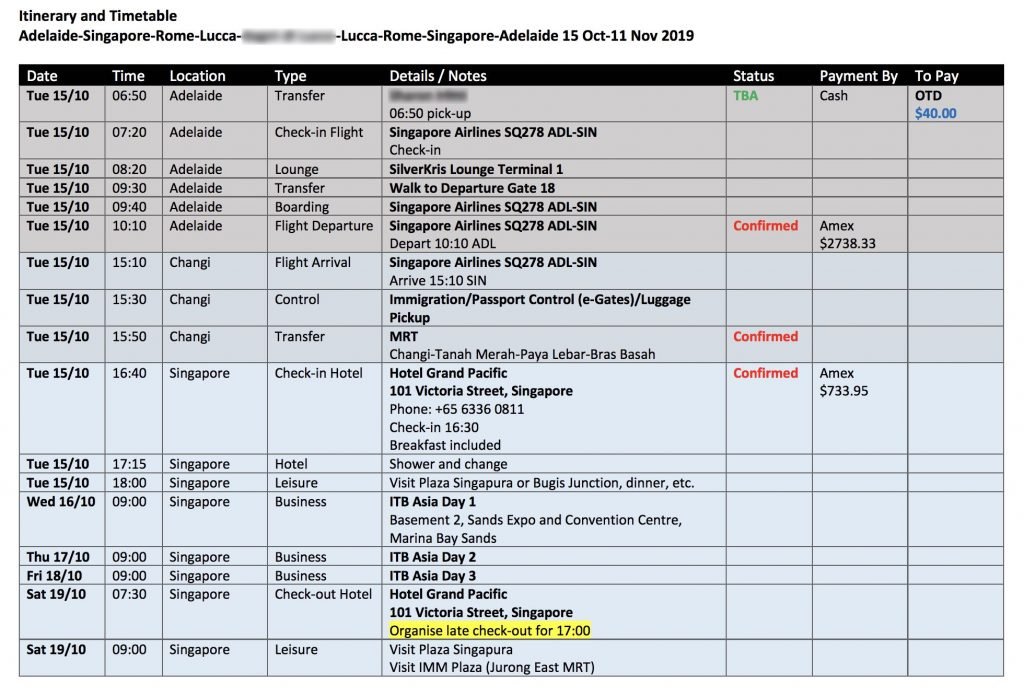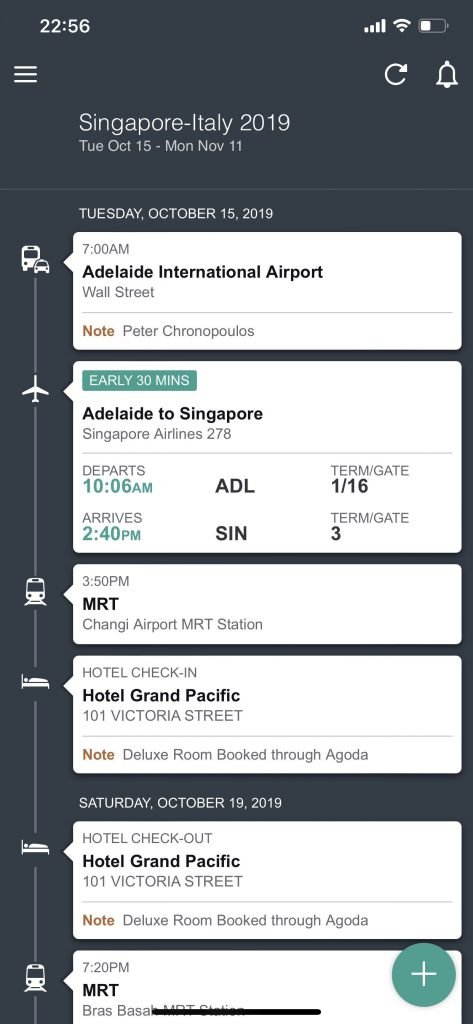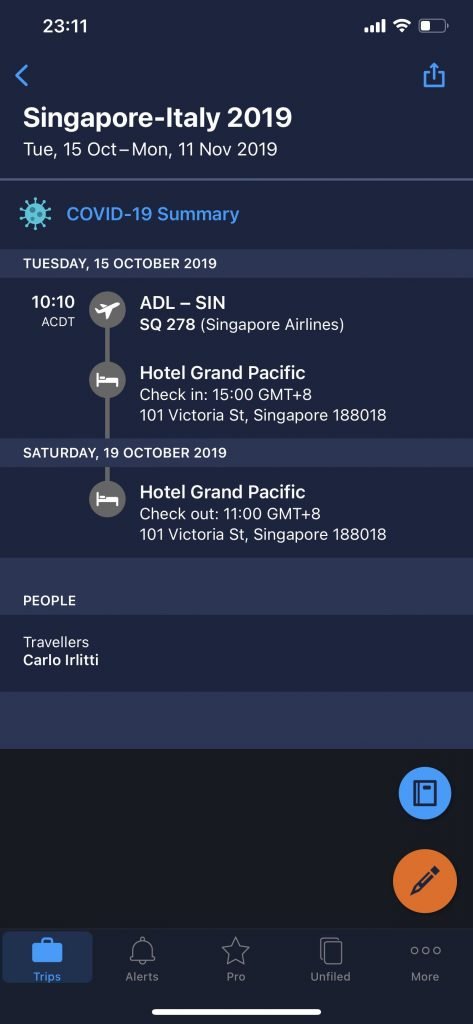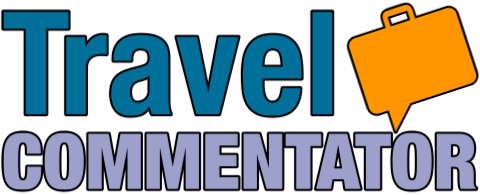Travel Planning
The best way to build up travel expectations is to plan things yourself…my opinion.
Visiting and experiencing new places is exciting, but before getting there one has to plan. I find the organising and planning of travel inspiring. It gets me dreaming and itching to go.
I like to research and plan on my own. So, I’ll scour the internet for all the info I can find on the place(s) I’ll be visiting and how I’ll get there and spend my time. Of course, I could get a travel consultant to do all the work but that would take away the fun of doing things myself and build up that expectation I mentioned in my introduction quote.
Planning is not as hard as one might think. It is only a matter of finding the time to do the research and then put things together in an ordered way and in an easily readable format. Thanks to the internet all the info one requires is only a few keystrokes away.
Where do I get my information from?
My planning starts with reading travel guides and other travel literature, watching videos and researching detailed information online.
- Travel guides and travel magazines are a great starting point. They can be bought, borrowed from libraries or accessed online and downloaded. Other travel literature, such as travel brochures can be picked up from travel agents or by writing directly to tour companies, cruise lines, etc.
- Videos can be found mostly on YouTube but also on other social platforms.
- Other detailed information can be obtained online directly from the service provider. Examples are: public transport operators, bus, train, ferry companies, airlines, hotels, etc., where you can find timetables (schedules), fares and ticketing, maps, etc. Some other examples of info you’ll need is where to: shop, sightsee, eat, etc.
Most of the important information I need is online. So, I rarely get brochures, except perhaps those on cruises. I’m not saying brochures aren’t helpful. If you like to have something physical to read and look through then a good travel agent will have the right printed matter for you. Brochures can be very inspiring as well and you need to start somewhere. Anyhow going straight online I download what I need and save a PDF file to peruse later.
How do I put everything together?
First I make a list of events, tasks, places and activities. Second, I organise them in chronological order with dates and times. Lastly, I transfer the lot into a word programme template with columns covering dates/times, locations, activities and costs. A spreadsheet also makes a good template. For some it may be easier. Definitely better if you like to add up costs. A copy of the list is then exported as a PDF file which I upload to my mobile phone, tablet or laptop.

Travel Planner apps
Alternatively you can go a step further by running an app on your smartphone, tablet or laptop. The best apps I have come across are: TripCase (Sabre), TripIt (SAP Concur) and CheckMyTrip (Amadeus). I’ve used all three, sometimes concurrently. All are free. TripIt also comes in a paid pro version which is ideal for anyone travelling for business. Together with the apps I consult the PDF file, which I keep as my primary source of information and then check the apps for any changes, like departure gates at airports, delays etc. Also with the apps I can add a task or event quickly. Of course being a savvy traveller I always look for information on boards and monitors and listen to announcements to be sure.



Other travel planning and organising apps to consider are: Funliday, Plip, Portico, Sam, TravelerBuddy, Travelload, TripRider/TripRider Lite, Tripsy and Wanderlog. Not all have the same features, some more, some less. Some are intuitive and others are less taking more time to get hang of, but all round I consider them to be good alternatives to the three I use. Hopefully I’ll be able to review all of these apps at some stage. Anyhow if you stick with TripCase and CheckMyTrip at least, you will know they belong to two major global distribution systems (GDS), Sabre and Amadeus used by many travel agents.
Now back to how I plan my travels…
What are the main points to consider?
- Time and weather factors: dates, public holidays, climate, clothing.
- How to get there: flights, rail, road, sea.
- Where to stay: hotels, resorts, apartments, b&bs, homesteads, etc.
- Where to eat and drink: restaurants, cafés, bistros, tavernas, pubs, etc.
- Where to buy food and groceries: supermarkets, delis, specialty shops, etc.
- What to see, visit and do: museums, galleries, antiquities, activities, shopping, etc.
- How much does it cost: affects all of the activities.
- Where and how to book: direct with the provider, travel agent or OTAs.
How far ahead do I plan?
Depending where I’m going I tend to plan travel between 12 and 18 months ahead of day of departure. If it is somewhere I’ve never been to before or if I’m planning to travel with my family it will definitely be 18 months. The added 6 months gives me more time to research the extra activities, etc., the family may want to enjoy. Then around 12 months before departure I’ll book the flights and accommodation. With cruises I’ve found that you can plan earlier than 18 months and even book, but if you need to fly you may have to wait until the flight schedules are released around 12 months or so prior departure date just so all bookings are done at the same time.
When I travel on my own I usually plan around 12 months prior and try not to book anything less than 6 months from date of departure. If it is somewhere I’ve been to before and I can still get flights and accommodation at a good price then 6 months is still OK. I’m very conscious on how much I spend and like to get my money’s worth, so more often than not I will book early and lock-in the earlybird offers. The money saved can go on other things during travel.
So the earliest you prepare yourself the better in my opinion. That way there’s always room to make adjustments if required.
When do I travel and why?
Picking the right time to travel depends on many factors. Time off work, health, weather, season, special offers, etc. I don’t have many limitations when I choose to travel, however I do have my preferences. I avoid the northern summer and winter and travel during March, April, May, September, October and November. These months fall in between high and low seasons and is referred to as shoulder season. Other reasons why I travel at these times are:
- Prices for flights and accommodation are more competitive.
- Weather is still acceptable, not too hot or too cold.
- Crowds at sights etc., are usually bearable, not overcrowded.
Prices
Since I have my preferred months of travel and try not to deviate from those times I don’t really need to search the travel aggregators (and online travel agencies) for the cheapest flights or hotel accommodation. Also I’ve found that the airfares and accommodation prices during the shoulder seasons aren’t too far off being the cheapest anyway. With airlines it is virtually impossible to strike up deals unless you can manage to spend a huge amount of money (preferably as a travel agent) to get any discounted fares. Best to go for their earlybird specials or a promotion. Just be sure to get the dates you want. With hotel accommodation there is more of a chance getting a better price. Go direct and negotiate. That means do not book through an OTA (online travel agency). It will be a win-win for you and the accommodation provider.
If you are not like me and can travel at any time and do want the best prices then do use a travel aggregator. Just make sure you can organise yourself in time for your travels.
Climate and Weather
The climate of a region I travel to will give me an idea of what weather to expect. For example Singapore which is close to the equator is tropical and is hot and humid all year with a dry and wet season. Around the Mediterranean it’s hot in summer and cool and wet in the winter. In other regions it could be arid and dry or semi-arid, or cool and wet or a combination depending on the season. Try to avoid hurricane, cyclone and typhoon seasons in the countries where these take place. These weather events will not only impact you on what you’ll be wearing but on how you move around and where you will stay. Flights can be delayed and cancelled. Accommodation can also be affected by the severe weather. So picking the right time of year is important not just for comfort and what goes into the luggage but also personal safety. Weather is definitely a major factor in picking the best time to travel.
Crowds
Too many people is something I like to avoid. Especially in summer, heat and crowds don’t go well together. If it is a concert, sporting or cultural event crowds are unavoidable. I try to stay way clear unless it is manageable.
Public Holidays
When I fly I make sure not to depart or arrive on a public holiday. Also always best to avoid holidays that fall over a long weekend when people are trying to reach home for the special occasion. On national public holidays there could also be less public transport available so make sure to research this. Some other public holidays may even be a bonus, in particular those tied to a historical or cultural event. Best though that they fall at a time when you are already at the destination and not transiting.
Good places to check for national public holidays, special occasions and long weekends see the following…
Packing and Luggage
The clothes you pack will be determined by the weather and climate and the activities you will undertake at destination. Obviously in warmer weather you can carry less weight or more clothes, shoes, accessories, etc. In colder weather heavier clothes will limit what you take. If you are going skiing, surfing, bike trekking, etc., you will obviously have more weight and will pay accordingly for extra luggage.
For more details on how and what to pack see the article Luggage and Packing.
Costs and How to Pay
How do I work out my expenditure and daily costs? At places where I’ve been to before it is easy to calculate the approximate daily costs as I have kept receipts, but where I haven’t been the easiest way I have found to ballpark a figure is to work out roughly what I spend at home for food and transport. Then convert that into the currency of the country where I am. It may not be precise but it gets me close. I also always err on the side of caution by rounding up not down and adding a little more. So in countries where the cost of living is higher than home I’m covered. In those lower I’ll have extra cash. Simple.
Accommodation, airfares and some other transport fares (pre-purchased tickets) have been already paid for and are fixed. These I input into the template. The variables are: eating out, food, entry fees, taxi and public transport, souvenirs, medical and other purchases and any incidentials or miscellaneous expenses, etc. These I leave out and try to keep the receipts for later study.
When it comes to paying I use cash and credit/debit cards. I don’t use traveller’s cheques (which are very rare anyway), travel money cards and ATMs. Traveller’s cheques are a dying breed and I don’t know if banks issue or recommend them anymore. I know Travelex (foreign currency exchanges) issue American Express Travellers Cheques. If you have these, you’ll then need to be sure the merchant or the place you want to spend them at will accept them. I mean they still do exist and don’t expire but with credit/debit cards and travel money cards they have basically become reduntant. Tavel money cards are those that you load up (and top up) with foreign currency and are usually issued by banks, but they can be purchased elsewhere as well, like Travelex, Cash Passport (Mastercard), etc. I don’t use these cards as I prefer credit/debit cards. I don’t see the value since you can get the same or better rates with credit/debit cards. Of course they lock in a rate at the time you purchase the card which hopefully will be the best rate during that period of time, but there is always a fee the bank charges for the card at time of purchase and there could be fees when reloading. So make sure you shop around for the best card. As for ATMs (automatic teller machines) I see them as a pain and only good if you are in dire need of cash. They are not always where you want them to be, there are fees and there is always the security risk.
So I recommend carrying a couple of credit cards, a debit card linked to a foreign currency account and some cash. The credit cards preferably any that give you rewards. That’s a bonus, especially when used abroad when you should earn more, but remember the conversion rates and if any fees are charged. Otherwise any VISA or Mastercard will do. I carry an American Express card (of the platinum kind), a VISA credit card (issued by my local bank) and a Citi Mastercard debit card with foreign currency accounts, and of course, cash in various currencies of the countries I’m visiting. Besides the cash, the Citi debit card is the best option. The linked account can have up to ten different currencies and as long as you have enough in your account you can convert to the currency you require when the rate is at its best. This way you don’t have to carry bundles of cash with you. Citi also gives conversion rates comparable with foreign money exchanges or better. HSBC also has a similar debit card that has ten different foreign currencies.
Credit, debit cards and online accounts are also great for paying bills while away from home. Make sure you use data from a SIM and not WiFi for security reasons. WiFi should only be used for sending greetings and trivial messages (SMS or email) and for surfing and researching on the internet and not for bank transactions, paying bills, making purchases, bookings/reservations or sending sensitive or personal details.
At some stage I may do an article on credit/debits cards, the different bank accounts, travellers cheques, travel money cards and wallets and highlight their pros and cons. Here is that article: Travel Money: Cash, Cards or Cheques?
Where and How to Book
This comes down to personal preference where and how to book. I book direct, but If you have been dealing with a travel agent for a while and trust their knowledge and service then by all means stick with them. A good travel agent is like gold. The biggest help they can give you is when things go wrong. Hopefully this will never happen but they will go to work for you and problem solve, saving you a lot of worries. Things move quicker when travel providers have to deal with agents. They do have clout.
After a few years booking through a travel agent I decided to start doing all the bookings myself. In this time I established relationships with airlines, hotels, rail and land transport services so it became easy to book direct and at the same time build up loyalty, which is an added bonus.
I have booked just flights with my travel agent. This happens when I travel at short notice. Travel agents can still get you (good) seats on planes when it is harder for you. A friend of mine only decides to book his flights three days before departure and has always had success through his agent (which is the same one I’ve used in the past).
Accommodation if left late can be a problem, especially if you miss out on a place close to where you want to spend most of your time and is of the right quality. Then you’ll be left to search through the aggregators and OTAs (Booking.com, Agoda, etc.), for a last minute place to stay. Or you may have to compromise on price, quality and location. Modes of transport like fast trains become more expensive the closer to the date of travel. Prices and availability of other trains, road transport and taxis change very little. But as I said earlier booking in advance is always better. Peace of mind and good prices too.
Flights
So book your flights directly with the airline of your preference, perhaps because of their frequent flyer scheme and airline alliance or because they are the cheapest or the most direct. Do this preferably at a time when their fares are the lowest. Either as an earlybird offer or during the off-season or day of the week all depending when you can or want to fly. This is what I do, but of course I’ll go for the earlybird deals if they fall within the dates I want to fly. You can do this by signing up with the airline or getting your travel agent to keep you informed (perhaps by email or a newsletter). Also choose the right fare class, whether fully refundable, partially or non-refundable and of course whether in Suites, Business, Premium Economy or Economy Class. These different classes also affect frequent flyer mileage or points. Choose wisely if you are in a loyalty programme.
Accommodation
As soon as you’ve got your dates, lock in the flights and move onto the accommodation. I go to the aggregators to check prices then go direct to the hotel where I want to stay and deal direct. Quote the cheapest price you find and see what they can offer you. Sometimes they’ll better the price (by 5-10%) other times because of the agreements they have (with the OTAs) they won’t but will throw in extras, perhaps breakfast (if not part of the price), room upgrade, WiFi, laundry, fruit basket, complimentary drinks and other vouchers, etc. You have nothing to lose by asking. Hotels and other accommodation providers prefer to deal direct saving them paying commission (15-30%) to the OTAs. Hotel chains like airlines have their own loyalty schemes so here too choose the right category of room required and only book through the hotel as OTAs will not pass on the chain’s points but may only give you their own. This is a personal choice,
Land Transport
Next organise all your transport to/from airports, to/from accommodation and in between destinations. Some cannot be paid for a long way ahead, like fast trains in Europe. You’ll have to wait until 120-90 days before the scheduled date. Others you can pay on the day, like taxis and public transport. Limousines and chauffeurs can be booked early though if you prefer to be pampered that way. Fast train companies like airlines and hotel chains will have their own frequent traveller points. So again, if you like chasing points make sure to book the right class of ticket. I do everytime when I travel in Italy with Trenitalia. At some stage if I have enough points I can get discounted fares. All adds up.
There will be more details in another article regarding booking airfares, accommodation, train tickets and frequent flyer/loyalty programmes.
If things go wrong
All your travel plans may not all come to fruition. There are many things that can go wrong. You are away from home, in most cases in places where things can be much different. Language and culture for starters. So, there is always the element of risk. It can be: overbookings, delays, cancellations, closures, lost luggage or other external factors like: weather, political unrest, war, pandemics, etc., where you have very little or no control over. Some changes can be done on the run, others will turn things upside down and force you to put a stop to your travel and holidays. Contingencies are always good to have. That’s why good research and planning should be done before leaving home.
Unforeseen circumstances also brings up the subject of Travel Insurance. It’s not the first thing you do when planning travel, but a very important step when things are finalised. Travel Insurance can help alleviate damage in many of the already mentioned circumstances, but not all. Anyhow, I tend to do this after all is planned and pick the right package to suit. I won’t get into travel insurance here, as it’s a topic better dealt with on its own and by someone who has experience and knowledge on the subject.
Here’s a recap of what I organise, from start to finish. Use this as a checklist and tick off as you do them. These are not in a specific order.
Things to organise and check off:
- Choose the dates of travel, from beginning to end. Checking the season and weather for that time of year. Also check for national holidays. Price of flights and accommodation is also a factor not to forget about.
- The destination or destinations and itinerary.
- What to pack (for the time period, climate and terrain/comfort/safety/health). Make a packing list.
- How to get to and from airports and cruise terminals.
- Flights outbound, inbound and any in between.
- Accommodation.
- Transport options including transfers (taxis, hire cars, public transport) from/to airports, railway stations, cruise/ferry terminals, etc.
- Where to eat in/takeaway or where to buy food to prepare (supermarkets).
- What to see and do, including shopping.
- Travel documents in paper and digital format (passport, air tickets, accommodation vouchers).
- Travel insurance (appropriate for coverage, length of time, type of travel, location, activities, etc.).
- Costs, confirmed bookings, pre-paid before departure, what is to be confirmed or arranged on the day.
- Foreign currency whether cash, debit cards or travel money cards, location of ATMs (fees and charges).
- Travel apps, maps and guides.
- Set aside house keys, locks, luggage belts, reading glasses, smartphone, SIM(s), tablet, laptop, flash drives, spare batteries, chargers, adaptors, powerbanks, cables, etc.
- Locking up the house/apartment making sure it is secure, leaving a set of spare house keys with a family member or someone you trust, collection of mail, tending and watering the garden, feeding and taking care of pets, paying bills (if you can while travelling or a family member/friend back home), etc.
The last point is important so don’t forget this. It’s not just preparing everything for travel, it’s also how you leave things behind and how they’ll be taken care of when you are away so that when you return home you will have no hassles.
Notes: 1. With the acquisition of Citi’s consumer banking business in Australia by National Australia Bank Limited (NAB) in June 2022, the Citi Mastercard debit card (Citi Global Currency Account) was discontinued in May 2023. There are no replacements for this type of account by NAB at this time. 2. The travel planning app TripCase is no longer available.














